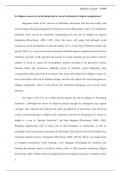Solenn Le Guyon – SO468
Is religion a source of social integration or social exclusion for migrant populations?
Integration refers to the “process of settlement, interaction with the host society, and
social change following immigration” (Penninx & Garcés-Mascareñas, 2016: 11). Within this
definition, there can be no monolithic interpretation for the role of religion on migrant
integration (Hirschman, 2004: 1207). First, this essay will argue that although social
inclusion or exclusion depends on national context of U.S. versus that of Western Europe, and
specific faith, it is a source of social exclusion for Muslim migrant populations more than for
Christians. Second, it will argue that the reasons for social exclusion are not a direct result of
religion so much as caused by Islamophobic policies reacting to the perceived conflict
between Islam and secularism. Although meant to facilitate social integration, they
exceptionalise Islam and result in exclusion. This essay will compare the religious context of
the United States with that of Western Europe, and how this affects the social integration of
religious immigrants. Then, it will contrast how Christians immigrants are received versus
Muslims.
The nature of the U.S. as a settler society impacts the role of religion in “becoming
American”. Although new forms of religious practice brought by immigrants may appear
“foreign”, they represent the characteristic path of adaptation of newcomers into American
society; and participating in religious and community activities by being part of a church or
temple is a way to “become American”, and thus integrate (Hirschman, 2004: 1206).
Religious organisations take a central role in the foundation of community, as well as
providing social and economic assistance for the needy. They fill the void left by smaller, less
proximate families for new immigrants (Hirschman, 2004: 1207-8). There is no requirement
of complete assimilation: while learning a new language, developing new loyalties, and
learning the primary tenets of political culture, there is little pressure regarding religion
(Hirschman, 2004: 1209). Churches mitigate barriers immigrants may face to intimate circles
1
, Solenn Le Guyon – SO468
of friendships, clubs, and other social groups, thus providing alternative avenues for social
advancement, leadership, community service, and respect lacking from the wider community,
helping religion to be a source of social integration as opposed to exclusion, regardless of
religion (Hirschman, 2004: 1229). Additionally, Americans are significantly more religious
than Western Europeans, allowing state institutions and constitutional principles to provide a
foundation for greater acceptance and integration of non-Christian religions (Alba & Foner,
2008: 374).
In contrast, Western European states like France, Germany, and Britain prioritise
secular politics, relegating religion to the private domain of individual believers
(Kastoroyano, 2004: 1234). Nevertheless, France, despite its claim to laïcité and reasonable
modernity, is culturally Catholic: six out of ten public holidays are religious; and similarly to
the U.S., Christian immigrants are better received than their Muslim counterparts (Tolan,
2017: 48). However, contrarily to the U.S., Muslims have become the largest religious
minority in Western Europe, and is mainly comprised of immigrants (Alba & Foner, 2008:
374-5). Alongside the secular majority’s suspicion of Islamic faith and its public
requirements, Western European societal institutions and national identities remain anchored
to Christian founding principles, failing to make equal room for Islam (Alba & Foner, 2008:
374). Subsequently, the public recognition and representation that Muslim populations in
Western Europe request challenges democratic states’ approaches to diversity and
multiculturalism, countering the perceived dichotomist view that opposes assimilation and
multiculturalism in these states (Kastoroyano, 2004: 1235). For example, assimilation in
France relies on immigrants accepting and internalising the separation between religion and
public life (Kastoroyano, 2004: 1236-7). French laïcité is ambiguous about the boundary
between culture and religion, seen as progress towards ‘modernity’ (Kastoroyano, 2004:
1240; 1243). Western European states’ distinction between private and public, and their
2




